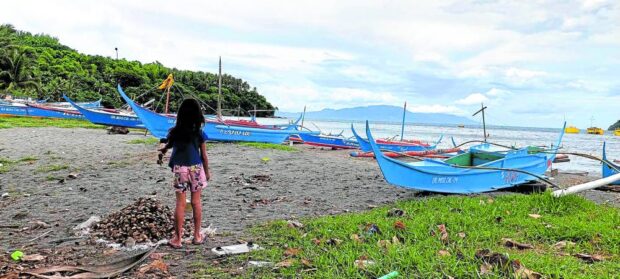
OUTDOOR PLAYTIME | A child of a fisherman at Barangay Lazareto in City of Calapan spends her free time along the shoreline in this photo taken on Monday. The girl is unmindful of the oil spill that hit a large part of Oriental Mindoro in February, with fishers still reeling from its effects. (Photo by MADONNA T. VIROLA / Inquirer Southern Luzon)
LUCENA CITY, Quezon, Philippines — Environment advocate group Protect the Verde Island Passage (Protect VIP) on Monday challenged President Ferdinand Marcos Jr. to address his government’s “lackluster response” to the first major environmental disaster confronting his administration.
“As the President’s first year in office concludes, we challenge the Marcos administration not to prove itself as a government that settles for hollow wins in the oil spill crisis… turning a blind eye to the ailing health of the VIP,” the Protect VIP said in a statement issued on Monday, hours before President Marcos gave his State of the Nation Address.
The group maintained that thousands of fishing families continue to reel from the effect of the Feb. 28 oil spill caused by MT Princess Empress, which sank while carrying some 800,000 liters of industrial fuel in the waters of Naujan town in Oriental Mindoro.
The incident, considered the first marine environmental crisis under the Marcos administration, caused a massive oil spill that affected coastal areas in Oriental Mindoro and Batangas, both of which are within the VIP corridor, as well as those in Antique and Palawan provinces.
Known as the “center of global shorefish biodiversity” due to the high densities of marine resources, the VIP is a 1.14-million-hectare marine ecosystem located off the coastlines of Batangas, Romblon, Marinduque, Occidental Mindoro and Oriental Mindoro provinces.
According to Protect VIP, the oil spill in the VIP has so far “disrupted the livelihoods and well-being of hundreds of thousands, caused billions in damage, and harmed the world’s most biodiverse marine habitat,” as the tragedy nearly marked its fifth month.
“We are gravely alarmed by the increasing pronouncements of government agencies and bodies, both local and national, to brand this situation as already resolved,” the green group said.
Fishing ban
The Philippine Coast Guard had declared that oil removal and recovery operations in the affected areas were already complete.
Over the last few months, fishing bans were lifted in Oriental Mindoro, leaving Pola, the ground zero of the oil spill, as the last town to still enforce the ban.
On July 20, Oriental Mindoro Gov. Humerlito Dolor announced the final lifting of the ban in Pola based on the recommendations of the Bureau of Fisheries and Aquatic Resources (BFAR).
“We are concerned by the lack of transparency on the scientific basis and methodologies employed by the government to order such lifting of fishing bans,” Protect VIP lamented.
The group noted that the Provincial Disaster Risk Reduction and Management Office of the Province of Oriental Mindoro had also sent out invitations “for a demobilization ceremony to announce the termination of the oil spill response.”
It recalled that over a month ago, the Department of Environment and Natural Resources published a situational report that still found oil and grease, hydrogen sulfide, and volatile organic compounds in Pola.
Protect VIP also questioned the BFAR test results, noting that the examinations “are not substantiated by published reports that would establish the conduct of a robust quantitative test.”
The group also noted that BFAR’s oil spill bulletin failed to show the comprehensive results of water testing in terms of oil and grease for water quality assessment and polycyclic aromatic hydrocarbons (PAHs) in fish samples.
Water quality
Saying the presence of PAHs, some of which are carcinogenic, is of significant concern, Protect VIP said these could “bioaccumulate in fish and cause harm if consumed over a prolonged period of time.”
The group said they conducted a rapid water quality assessment last week in six marine protected areas in Pinamalayan and Pola.
“It revealed that five of them exceeded water quality guidelines for oil and grease in protected areas,” the group emphasized.
It claimed that oil residue and tar balls are also still visible in some areas.
“These results lead us to question if the motivation behind the lifting of bans and similar efforts to conclude oil spill responses are genuinely in the service of returning the livelihood of fisherfolk, or is it a hasty and dangerous decision made to provide the Marcos administration means to claim a superficial success in its oil spill response efforts?” Protect VIP asked.
The group added: “With the latter, the authorities whose duty it is to prioritize the plight of fishermen and the consuming public are instead doing them a grave injustice by risking their health.”